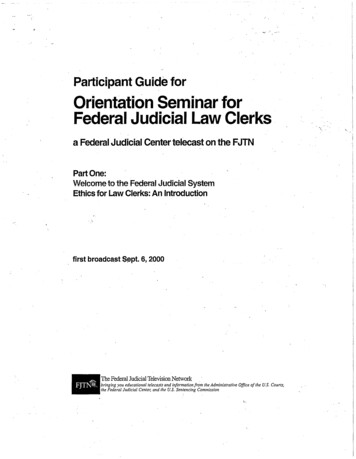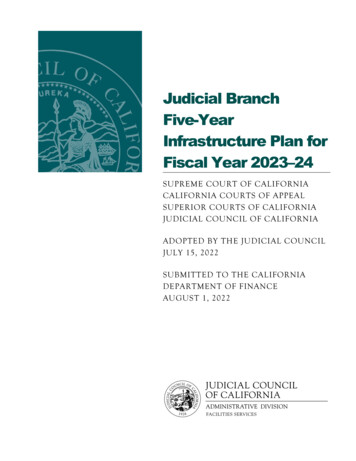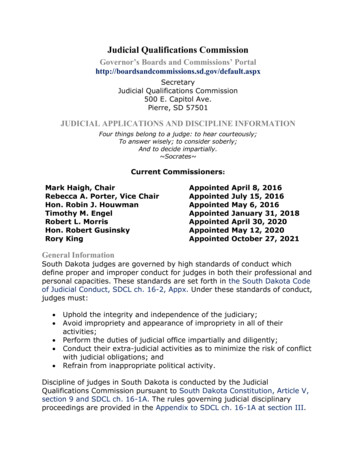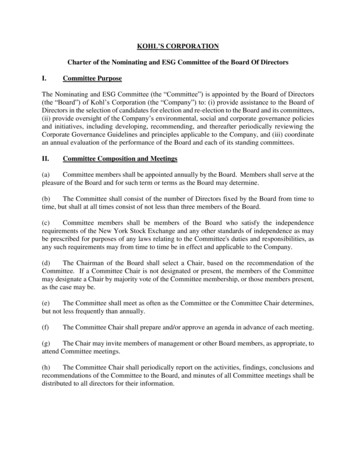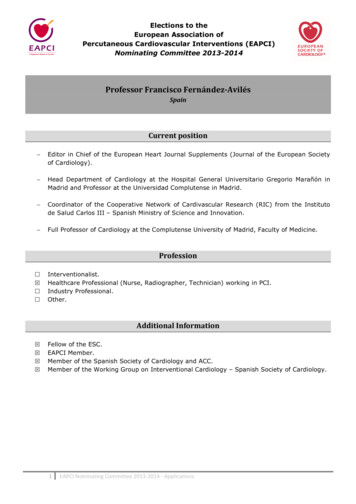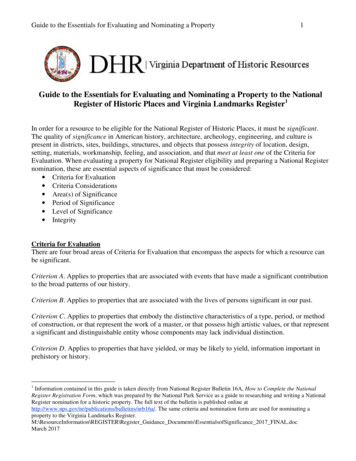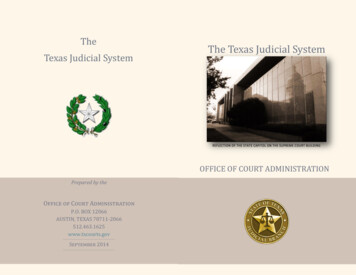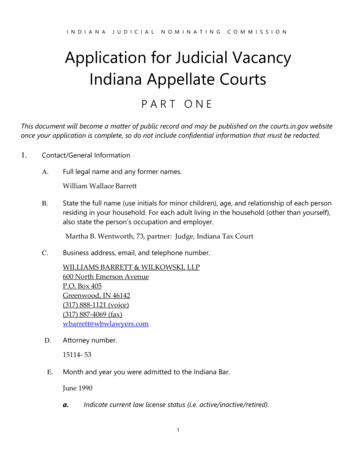
Transcription
I N D I A N AJ U D I C I A LN O M I N A T I N GC O M M I S S I O NApplication for Judicial VacancyIndiana Appellate CourtsPART ONEThis document will become a matter of public record and may be published on the courts.in.gov websiteonce your application is complete, so do not include confidential information that must be redacted.1.Contact/General InformationA.Full legal name and any former names.William Wallace BarrettB.State the full name (use initials for minor children), age, and relationship of each personresiding in your household. For each adult living in the household (other than yourself),also state the person’s occupation and employer.Martha B. Wentworth, 73, partner: Judge, Indiana Tax CourtC.Business address, email, and telephone number.WILLIAMS BARRETT & WILKOWSKI, LLP600 North Emerson AvenueP.O. Box 405Greenwood, IN 46142(317) 888-1121 (voice)(317) 887-4069 (fax)wbarrett@wbwlawyers.comD.Attorney number.15114- 53E.Month and year you were admitted to the Indiana Bar.June 1990a.Indicate current law license status (i.e. active/inactive/retired).1
I N D I A N AJ U D I C I A LN O M I N A T I N GC O M M I S S I O NActiveb.If you are or have been a member of the Bar of any other state, identify thejurisdiction and provide date(s) of admission and current license status.Ohio-November 1989:Florida-December 1991:F.Active, Bar ID # 0043506Active, Bar ID # 91-1259Date and place of birth.October 1, 1962Mount Kisco, New YorkG. County of current residence and date you first became a resident.Johnson County. I first became a resident of Johnson County on July 31, 1993.2. Secondary Education/Military ExperienceA.List all undergraduate colleges and universities you attended. Include the school name;dates enrolled; degree or certificate earned; and any academic honors, awards, orscholarships you received and when. *As part of your Supplemental Materials, provide atranscript—including a certified transcript for your original hard copy—for each schoollisted; redact your Social Security number if it appears on the transcript.Miami University, Oxford, OhioAugust 1980-May 1984Bachelor of ArtsS.U.N.Y. College at Brockport: Brockport, New YorkSummer 1981 (No degree or certificate—credits transferred to Miami University)Universidad de Salamanca: Salamanca, SpainSummer 1985 (Intensive Language Study. No grade or credit received and no transcriptavailable.)HONORSUndergraduate:Dean's List: Fall 1982, Spring 1983, Fall 1983, Spring 1984Phi Alpha Theta: National History Honorary SocietyHigh School:National Honor Society: Spring 19802
I N D I A N AJ U D I C I A LN O M I N A T I N GC O M M I S S I O NNew York State Regents Scholarship: Spring 1980B.If applicable, list any military service. Include the name of the military branch;dates of service; last rank achieved; and any honors, awards, or commendationsreceived and when. *As part of your Supplemental Materials, provide a copy ofyour Certificate of Release or Discharge from active duty (“DD 214” paperwork).Not applicable3.Post-Secondary EducationList all law schools, graduate schools, and post-J.D. programs attended. Includethe school name; dates enrolled; degree or certificate earned; class rank; and anyacademic honors, awards, or scholarships you received and when. *As part of yourSupplemental Materials, provide a transcript—including a certified transcript for youroriginal hard copy—for each school listed; redact your Social Security number if it appearson the transcriptIndiana University Graduate School: Bloomington, IndianaAugust 1985-May 1986Master of Arts—Russian Legal HistoryIndiana University School of Law: Bloomington, IndianaAugust 1986-May 1989Juris Doctor, cum laudeClass Rank: Top thirdHONORSPost-graduate:Rotary International-Group Study Exchange Fellow,Sweden and Poland, 1993Law School:Honors Graduate: cum laude May 1989Dean's Honors: Fall 1988Top Grade: International Law, Fall 19874.EmploymentA.Provide your employment history since graduation from college. Include name ofemployer, titles or positions, locations, and dates of employment.3
I N D I A N AJ U D I C I A LN O M I N A T I N GC O M M I S S I O NWilliams Barrett & Wilkowski, LLP, AttorneysGreenwood, IndianaPartner: June 2009-presentWilliams Hewitt Barrett & Wilkowski, LLP, AttorneysGreenwood, IndianaPartner: January 2003-June 2009Associate: October 2000-December 2002(The firm was known as Williams Hewitt & Robbins, LLP, until January 2005)Magistrate, Johnson Circuit and Superior CourtsFranklin, IndianaJanuary 1997-October 2000Johnson County Prosecutor’s OfficeFranklin, IndianaAssistant Chief Deputy Prosecutor: October-December 1996Deputy Prosecutor: December 1994-October 1996Chambers of Judge Thomas G. Fisher, Indiana Tax CourtIndianapolis, IndianaSenior Judicial Clerk: June 1993-December 1994Judicial Clerk: August 1992-June 1993Chambers of Judge John G. Baker, Indiana Court of AppealsIndianapolis, IndianaSenior Judicial Clerk: July 1991-July 1992Judicial Clerk: December 1989-July 1991Harter, Secrest & Emery, AttorneysRochester, New YorkSummer Associate: July-August 1988Summer Associate: June-August 1987National Oceanic and Atmospheric AdministrationWashington, D.C.Summer Intern: May-July 19884
I N D I A N AJ U D I C I A LN O M I N A T I N GC O M M I S S I O NPenn Mutual Life Insurance CompanyRochester, New YorkLife Insurance Agent: August 1984-August 1985B.If applicable, describe the nature and extent of your practice of law (present andformer), and provide the names of your partners, associates, office mates, andemployers.1.Private PracticeIn October 2000, I began private practice in Greenwood, Indiana, as an associate in thefirm of WILLIAMS HEWITT & ROBBINS, LLP. I became a partner in January 2003, and the firmname changed to WILLIAMS HEWITT BARRETT & WILKOWSKI, LLP in January 2005. In June2009, one partner dissolved that partnership and the remaining partners formed WILLIAMSBARRETT & WILKOWSKI, LLP, that same month.My practice is focused on civil litigation and transactions for individuals and smallbusinesses; estate planning and administration; local government representation; andelection/campaign finance law. Because I maintain active Florida and Ohio law licenses, myestate planning and administration work frequently includes assisting Florida clients in estatematters and related real estate transactions, while my most recent engagement in Ohio in 2021involved advising majority partners in a central Ohio law firm on the nature and extent of theirfiduciary rights and responsibilities to a dissenting partner.My litigation work regularly includes Civil Rights matters, Indiana Tort Claims Actmatters, commercial, probate, and real estate litigation. I have represented clients in federal andstate courts (in approximately 25 counties) around Indiana, including successful litigation to a5
I N D I A N AJ U D I C I A LN O M I N A T I N GC O M M I S S I O Njury and on appeal. In addition, I have served as litigation counsel for Johnson CountyGovernment and the Johnson County Sheriff’s Department since 2005. I also serve as regularcounsel to the City of Southport, the Johnson County Plan Commission, the Johnson CountyBoard of Zoning Appeals, the City of Franklin Police Merit Commission, the Town of Trafalgar,and the Town of Trafalgar Board of Metropolitan Police Commissioners. I have also served asBoard Counsel to the City of Carmel Police Merit Commission, the City of Greenwood Fire MeritCommission, and the Johnson County Sheriff’s Merit Board, and as Chief’s Counsel for theFranklin Fire Department.My practice has also provided me with opportunities to work with Indiana Stategovernment, and I have represented clients before, or in litigation with, approximately 16 statejudicial and administrative agencies. These include, by way of example, the Supreme CourtDisciplinary Commission, the State Ethics Commission and Office of Inspector General, theSecurities Division and the Election Division of the Office of Secretary of State, and the UtilityRegulatory Commission.In addition, because of my experience as a Law Clerk for the Indiana Tax Court, describedbelow, I have represented clients in several tax controversies with the Indiana Department ofRevenue, the Indiana Board of Tax Review, and other taxing agencies. See, e.g., Whitelick IndianaAerie 3702 Fraternal Order of Eagles, Inc. v. Hendricks County Property Tax Assessment Bd. of Appeals,82 N.E.3d 940 (Ind. Tax Ct. 2017) (Special Judge Mark GiaQuinta); Trinity School of Natural Health,6
I N D I A N AJ U D I C I A LN O M I N A T I N GC O M M I S S I O NInc. v. Kosciusko County Property Tax Assessment Bd. Of Appeals, 799 N.E.2d 1234 (Ind. Tax Ct.2003).As a partner in our firm, I share responsibility for payroll, personnel decisions, marketing,and management--all the elements of ownership and responsibility of any private enterprise, aswell as responsibility for client service under the Indiana Rules of Professional Conduct. In thatregard, I work daily with all the attorneys and staff in our firm to deliver client service in acollegial and cordial environment that is respectful of all employees, clients, and opposingparties and their counsel. I am proud that we have cultivated an environment where peoplewant to stay, and that the average tenure in our firm, attorneys and staff alike, is over 14 years;excluding recent hires to address expansion and replace retirees, the average tenure is almost 16years. I am proud, too, that my late partner Jon Williams, who died in 2020, led our firm forover four decades.Seventeen people work at our firm: two partners, six associates, one of-counsel, and eightparalegals, legal assistants, and office staff. Their names and titles follow below:William W. Barrett - PartnerJohn P. Wilkowski – PartnerJohn M. White – Associate AttorneyStephen K. Watson – Associate AttorneyDaniel J. Paul – Associate AttorneyDaniel J. Layden – Associate AttorneyBridget McDaniel-Associate AttorneyJacob Bowman-Associate AttorneyJ. Lee Robbins – Attorney, of CounselShauna Duke – ParalegalDianna Freese – Paralegal7
I N D I A N AJ U D I C I A LN O M I N A T I N GC O M M I S S I O NAmber N. Knapp – Legal Assistant/SecretaryDenise Parsley-Legal Assistant/SecretaryAleksandra Olszanska-Legal Assistant/SecretaryShannon Fahrner – BookkeeperDarlena Riley – Receptionist (part-time)Michele Johns – Receptionist (part-time)2.Judicial ServiceIn 1996, I was unanimously selected by the four Circuit and Superior Court Judges inJohnson County to serve as the sole Magistrate for all of those courts starting in January 1997,and I served in that capacity until I entered private practice. Under Indiana law, the Magistrateis an arm of the Court or Courts in which the Magistrate serves, and the Magistrate has noseparate jurisdiction. In Johnson County, however, the Magistrate functions as a separate courton a day-to-day operational basis. Therefore, I ran my own courtroom with a criminal and civildocket.The docket was heavy and consisted of all the County's small claims, civil protectiveorders, and misdemeanors, with frequent Special Judge assignments on Plenary Cases, ProbateCases, Felonies, and Marriage Dissolutions. During my tenure, the civil filings (small claims andprotective orders) averaged approximately 3,665 per year, and the criminal misdemeanor filingsaveraged approximately 1,835 per year. Moreover, because the Magistrate Court operated as aseparate court, I appointed Public Defenders, hired and supervised a staff of five, prepared anddefended an annual budget before the County Council, and managed the court facilities andequipment in negotiation with the County Commissioners.8
I N D I A N AJ U D I C I A LN O M I N A T I N GC O M M I S S I O NAs Magistrate, I presided over a number of jury trials and hundreds of bench trials, aswell as hearings on a broad range of topics, including criminal evidence suppression, landlordtenant, extradition, summary judgment, and child custody and support. Of the jury trials Iconducted, one was a negligence case under the Comparative Fault Act and the others werecriminal cases.3.Assistant Chief Deputy—Johnson County Prosecutor’s OfficePrior to my service as Magistrate, I served as a Deputy Prosecuting Attorney and as theAssistant Chief Deputy Prosecuting Attorney in Johnson County from December 12, 1994,through December 31, 1996. Within the Prosecutor’s Office, my primary responsibility wasprosecution of the felony cases in Johnson Superior Court No. 2 (Hon. Cynthia S. Emkes, Judge),as well as the defense of all Petitions for Post-Conviction Relief filed in all Johnson Countycourts. I also prosecuted juvenile matters in Johnson Circuit Court and worked in night courtin Franklin City Court. Furthermore, because of my experience as a judicial clerk, the Prosecutorasked me to assist him and the other Deputies with their written briefs and to provide them withweekly synopses of criminal rulings from the Indiana Supreme Court and Court of Appeals.I tried and argued hundreds of cases, including bench trials, bond and probationrevocations, delinquency and grand jury proceedings, and several misdemeanor and felony jurytrials to both six and twelve person juries.4.Judicial Clerk and Senior Judicial Clerk—Indiana Tax Court9
I N D I A N AJ U D I C I A LN O M I N A T I N GC O M M I S S I O NFrom August 1992 through December 1994, I served as a judicial clerk for the HonorableThomas G. Fisher, Judge of the Indiana Tax Court, where I was responsible for researching andpreparing drafts of judicial opinions, as well as supervising, training, and collaborating withjunior clerks, and editing their work.The Tax Court’s structure is unique in Indiana in that it is an appellate tribunal that alsoconducts de novo trials and review-of-record hearings. Accordingly, working for Judge Fisher,in addition to my substantive immersion in tax law, I had my first opportunity to learn docketmanagement and courtroom procedure that would be of invaluable assistance when I was laterappointed as Magistrate.5.Judicial Clerk and Senior Judicial Clerk—Indiana Court of AppealsAfter graduating from law school in 1989, I began my legal career as a judicial clerk forthe Honorable John G. Baker, Judge of the Indiana Court of Appeals. This was where I firstcame to love and respect the judicial process, and to understand the critical importance of theRule of Law to the functioning and success of our system of government.There could not have been a better start to a career in the law: to learn, from the verybeginning of one’s work as a lawyer, to approach the law from the judicial perspective, andespecially to learn from a mentor like Judge Baker, has been one of the defining elements ofmy career. Moreover, to have had that opportunity in a Court with the heavy and diversecaseload of the Court of Appeals not only exposed me to the broadest possible range of10
I N D I A N AJ U D I C I A LN O M I N A T I N GC O M M I S S I O NIndiana law, but also started teaching me how to triage cases based on the novelty orimportance of their issues, the complexity of their facts, and their procedural posture.5.Trial/Judicial ExperienceA. Describe the extent of your jury trial experience, if any.As discussed in the preceding and following sections, I have tried both criminal andcivil matters to a jury, both as counsel and as judge.B. Describe the extent of your bench trial experience, if any.As discussed in the preceding and following sections, I have tried both criminal andcivil matters to the bench, both as counsel and as judge.C. If applicable, describe the nature and extent of your judicial experience (including as a judgepro tempore). Include a description of your experience presiding over jury trials, if any.As discussed above, I served as Magistrate of the Johnson Circuit and Superior Courtsfrom January 1997 through October 2000, presiding over both criminal and civil bench and jurytrials. Since entering private practice, I have presided over a felony jury trial, as well as over anumber of bench trials, as Judge pro tempore in Johnson Superior Court No. 2 and other courts.At the time I completed my full-time judicial service as Magistrate and entered privatepractice, I was serving as Special Judge in approximately a half dozen child custody and supportcases. Mindful of the judicial and litigant resources expended for me to become familiar with theparties, their children, and the legal issues of their cases, and of the scope of a Special Judge’s11
I N D I A N AJ U D I C I A LN O M I N A T I N GC O M M I S S I O Njurisdiction under Ind. Trial Rule 79(L), I continued to serve as Special Judge on these cases afterentering private practice. Over the years, I conducted several modification of custody andsupport hearings until all of the minor children involved reached majority.As discussed above, my practice includes representation of a number of localgovernments. This has given me the opportunity to serve in the quasi- judicial capacity of BoardCounsel for the Carmel Police Merit Commission, the Franklin Police Merit Commission, theJohnson County Sheriff’s Merit Board, and the Greenwood Fire Merit Board in severaldisciplinary hearings. In those hearings, counsel for the Board acts as the judicial officer inmanaging pre-hearing matters and in conducting the hearing itself, with Board members servinglike a jury as the finders of factFurthermore, I have frequently served as Judge pro tempore, most often in JohnsonSuperior Court No. 2, but also in Johnson Superior Court No. 3, the Johnson County MagistrateCourt, Franklin City Court, and Shelby Superior Court No. 2. Since entering private practice, allmy judicial service, both as Special Judge and as Judge pro tempore, has been uncompensatedvolunteer work, totaling approximately 650 hours.Most recently, in October 2021, the Indiana Supreme Court appointed me as HearingOfficer in an attorney Disciplinary Complaint case. I did not conduct a final hearing in the matterbecause the Supreme Court accepted the parties’ Conditional Agreement settling the Complaint.See Matter of Stidham, 177 N.E.3d 1200 (Ind. 2022). I did, however, conduct two pre-hearingattorney conferences and issue preliminary orders prior to the Court’s decision.12
I N D I A N A6.J U D I C I A LN O M I N A T I N GC O M M I S S I O NProfessional Experience*As part of your Supplemental Materials, include as writing samples four selections (in total) from thewritten materials listed below in Questions 6A through 6C.A.If applicable, list up to five trial or appellate briefs and/or judicial opinions youhave written. Refer to them by caption, case number, and filing date.1.Memorandum in Opposition to ChallengeIn the Matter of the Challenge to Candidate Connie Lawson, Candidate for theRepublican Party, Indiana Secretary of StateIndiana Election Commission Cause No. 2018-12Memorandum Filed July 17, 2018Challenge DENIED by Unanimous 4-0 Vote. (Copy attached)2.Brief in Opposition to Petition for Transfer by Amicus Curiae :Kenneth Alford, et al. v. Johnson County Commissioners, et al.Shelby Superior Court No. 1 Case No. 73D01-1601-PL-000003Brief Filed April 23, 2018. Transfer DENIED, May 24, 2018. (Copy attached)(See Section 6(C)(2) below).3.Brief in Response to Petition for Review:Indiana Department of State Revenue, Inheritance Tax Division v. In Re TheEstate of Katherine S. Boehle, DeceasedIndiana Supreme Court (No case number assigned in the Supreme Court—TaxCourt Case No.49T10-0811-TA-62).Brief filed October 25, 2010. Review DENIED March 15, 2011. (Copy attached)4.Order Denying Motion to Suppress Evidence:State of Indiana v. Jeffrey RowJohnson Superior Court No. 3 Case No. 41D03-0903-CM-00285 (Service as Judgepro tempore)Order filed December 22, 2009. (Copy attached)5.Motion to Dismiss or, in the Alternative, Motion to Stay, and Brief in Support:13
I N D I A N AJ U D I C I A LN O M I N A T I N GC O M M I S S I O NWestfield Insurance Company v. Morgan County Rural Water Corporation , et al.United States District Court, Southern District of Indiana Case No. IP00-1714 C D/FMotion Filed February 20, 2001. Case DISMISSED September 6, 2001.(Copy not attached)B.If applicable, list up to five legislative drafts or court rules you have written or towhich you contributed significantly. Refer to them by official citation, date, and subjectmatter.Public Law 39-2013 (House Enrolled Act 1224), codified at IND. CODE § 26-1-4.1-108.This statute provides that Article 4A of the Uniform Commercial Code governs remittancetransfers that are not electronic funds transfers under federal consumer protection law.(Copy not attached).(See Response to Section 7(A)(1), below).Public Law 64-2020 (Senate Enrolled Act 216), Section 1, codified at IND. CODE § 514-3-2(l). This statute broadens the definition of the term “offender” as used the Access toPublic Records Act. (Copy not attached).(See Response to Section 7(A)(2) below).National Conference of Commissioners on Uniform State Laws:Revised Uniform Residential Landlord and Tenant Act em/DownloadDocumentFile.ashx?DocumentFileKey 2c1bcbbb-ea0e-f63c-2ed9-3eabec3611ae&forceDialog 0(Copy not attached). (See Response to Section 7(A)(1) below).Uniform Pretrial Release and Detention Act em/DownloadDocumentFile.ashx?DocumentFileKey dbc73615-ed33-8c93-65ae-9bee8b1a6326&forceDialog 0(Copy not attached). (See Response to Section 7(A)(1) below).C.If applicable, list up to five of your contributions to legal journals or other legalpublications. Provide titles, official citations, and a brief description of the subject matter.1.“Criminal Tax: Double Jeopardy Issues in State Taxation” Newsletter of the TaxationSection of the Indiana State Bar Association, vol. 2, no. 3 (Summer 1995). This was ananalysis of the Indiana Tax Court’s decision applying Indiana’s Controlled Substance ExciseTax in Clifft v. Indiana Department of State Revenue, 641 N.E.2d 682 (Ind.Tax Ct. 1994) (a case inwhich I assisted Judge Fisher) prior to the Indiana Supreme Court’s decision— Clifft v.14
I N D I A N AJ U D I C I A LN O M I N A T I N GC O M M I S S I O NIndiana Department of State Revenue, 660 N.E.2d 310 (Ind. 1995)—affirming in part andreversing in part the Tax Court’s decision. (Copy not attached).2. “Public Courts and Private Information” National Conference of State Tax Judges (1993)(Co-author). The theme of the paper was to offer guidance to tax courts in resolving theissues that arise when individuals and entities desire to maintain the privacy of proprietary,financial, and tax information during the public process of tax litigation. The paperdiscussed the statutory, procedural, and evidentiary tools available to courts to attempt tobalance the private and public interests implicated in such circumstances and reviewed caselaw relevant to the topic from around the country. (Copy not attached).D.Identify the five most significant legal matters entrusted to you, whether as a judgeor lawyer, and describe why you believe them to be so.1.Judicial Service—Treatment of Pro Se LitigantsAs Magistrate, I handled thousands of cases with pro se litigants, both criminal and civil.I always strove to remember that, for many of those people, their only involvement with thejudicial branch of government would be in their pro se appearance as a Small Claim litigant,Protective Order litigant, or as a misdemeanor defendant, and that it was therefore incumbenton me to make the process accessible, fair, transparent, and understandable. This was importantto me because our system of self-government cannot thrive without either an informed, involvedelectorate or governmental institutions that retain the trust and confidence of the citizenry.Although I had no control over the first, I did have the ability to give people their “day in court”so that they came away from the experience not only having been treated fairly, but believingthey had been treated fairly. With this in mind, I established court and staff procedures toreduce the number of court appearances per file, to make the litigation process transparent, andto allow adequate time to fully hear contested pro se cases.15
I N D I A N AJ U D I C I A LN O M I N A T I N GC O M M I S S I O NIn addition, many of the cases that are brought in the Small Claims docket are initiallyresolved by default judgment due to the non-appearance of the person(s) sued, but Indiana hasa strong preference for resolution of cases on their merits by the finder of fact, and Indianaprocedure (through Ind. Trial Rule 60(B)) therefore provides a method to seek relief from defaultjudgments. Accordingly, early in my tenure, I adopted a practice to “grant default judgmentsliberally and to set them aside equally liberally.” This approach allowed many pro se litigantsto have meaningful access to the judicial system without becoming mired in the proceduralformalities of T.R. 60(B). It also had the collateral benefit of keeping the heavy docket movingby allowing me to focus on the substance of contested cases.2.Private Practice—Constitutional Challenge to Indiana’s System of Indigent CriminalDefenseIndigent criminal defense at public expense is a federal and state constitutional right, butthe method of implementation of that right is left to the States to implement.From 2015-2018, I represented the Johnson County Commissioners and seven thencurrent and former Johnson County Public Defenders in class action litigation brought by sevenformer clients of the Public Defenders. The Plaintiffs claimed that Indiana’s system of indigentdefense, which allows for trial court judges to retain Public Defenders, violates the Indiana andFederal Constitutions, and that they, the Plaintiffs, were not given effective representation bytheir Public Defenders. See Alford, et al. v. Johnson County Comm’rs, et al., 92 N.E.3d 653(Ind.Ct.App. 2017), trans. denied, 102 N.E.3d 288 (Ind. 2018).16
I N D I A N AJ U D I C I A LN O M I N A T I N GC O M M I S S I O NThe case raised state-wide policy issues, as it challenged the system of indigent defenseprovided in dozens of Indiana counties pursuant to Indiana statutes. Specifically, the questionwas whether Indiana’s system of judge-appointed Public Defenders so compromised the PublicDefenders’ professional independence that the 6th Amendment right to counsel under Gideon v.Wainwright, 372 U.S. 335 (1963) and its progeny mandated the adoption of Indiana’s othersystem of indigent defense, a County Public Defender Board.I successfully defended the case on the ground, as stated in the brief attached in responseto Question 6A above, that the federal and Indiana constitutional duty to provide for indigentdefense rests with the State, not with any given County Board of Commissioners, and thattherefore, the remedy to the issue could not lie with the Commissioners.3.Private Practice—Mentally Disabled ClientsOne of the greatest challenges—and opportunities—of private practice is to assist clientsin crafting real-world solutions to the problems they face. This is especially so when the clientis unable to be fully engaged in the process.My representation of Jane Doe was one example of such a case. Jane was a congenitallymentally disabled client. When I represented her, Jane was in her early 50s, living with hermother, who was her legal guardian and caretaker. I became acquainted with the family becausethe mother had become concerned that she could no longer care for Jane due to her ownadvancing age. She accordingly sought help from Jane’s psychiatrist and me to place Jane intoa Medicaid-subsidized group home.17
I N D I A N AJ U D I C I A LN O M I N A T I N GC O M M I S S I O NI secured FSSA-Medicaid approval for Jane’s placement, but she refused to go andretreated further into anger, defiance of her mother, and wandering away from home. Shediscontinued taking her psychiatric medications and was arrested for shoplifting. The case wasdifficult because Jane had received Misdemeanor Diversion for a prior shoplifting charge a fewyears earlier. By working cooperatively with the prosecution, however, I was able to help Janeand her mother.In return for receiving a second diversion agreement, Jane agreed to (and did) resumetaking her medications, follow her psychiatrist’s orders, treat her mother appropriately, andlimit her wandering. She complied, and her life with her mother became more stable, allowingher mother to continue as her caretaker for a few more years.I was able to assist this family through difficult times to find a more stable and lessstressful life. This, to me, is the very essence of the lawyer’s role: meaningful service to thosein need.4.Securities Fraud ProsecutionIn December 1994, within two weeks of my first day on the job, the Johnson CountyProsecutor’s Office began a grand jury investigation of several allegations of securities fraudinvolving large sums of money, and I was given primary responsibility for the matter. Thetargets of the investigation were employees of the brokerage firm that later was the subject ofthe 2013 film, Wolf of Wall Street. They were represented by local counsel and attorneys fromaround the country who were sophisticated, experienced securities law experts who regularly18
I N D I A N AJ U D I C I A LN O M I N A T I N GC O M M I S S I O Nrepresented clients before the National Association of Securities Dealers, the Securities andExchange Commission, and state securities regulators.The matter was resolved quickly. The two most culpable individual brokers surrenderedtheir Indiana securities licenses, the brokerage firms agreed never to solicit business in JohnsonCounty again, and the County received a settlement in lieu of a Racketeer Influenced andCorrupt Organization Act (“RICO”) forfeiture. To have been given responsibility for such acomplex matter so early in my prosecuting career both allow
Florida-December 1991: Active, Bar ID # 91-1259 . F. Date and place of birth. October 1, 1962 Mount Kisco, New York . G. County of current residence and date you first became a resident. Johnson County. I first became a resident of Johnson County on July 31, 1993. 2. Secondary Education/Military Experience


